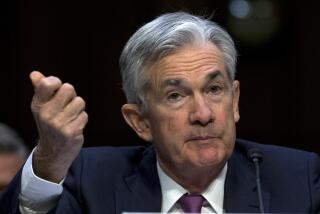Analyzing economics
- Share via
Re “Theorist is dead, long live the theory,” Opinion, Nov. 20
Niall Ferguson intimates that in the early 1980s, Milton Friedman was obscure at Oxford compared to John Kenneth Galbraith and John Maynard Keynes. My experience at Cambridge in 1975 was different: Keynes was filtered through textbooks, and you had to read my father on your own.
After 1979, Friedman was omnipresent, his doctrines embraced by British Prime Minister Margaret Thatcher and President Reagan, not to mention disseminated on TV. Now Ferguson argues that asset inflation resurrects an otherwise long-defunct Friedman doctrine. Money creation doesn’t cause consumer prices to rise, he says, but it does inflate the prices of stocks and housing.
Somehow China plays a role in this, by holding “any amount of U.S. dollars the Fed cares to print.” Never mind that the Chinese actually hold bonds -- which are not money -- not dollar bills. It’s a bizarre thesis for which no evidence is offered, no study or authority cited.
When Friedman wrote “inflation,” he meant a rising price of goods. By changing the definition arbitrarily, Ferguson transforms the monetarist hypothesis into an empty one. As a positivist, Friedman would have disapproved; indeed, unlike Ferguson, he was not immune to evidence and told the Financial Times in 2003: “The use of quantity of money as a target has not been a success.... I’m not sure I would as of today push it as hard as I once did.”
JAMES K. GALBRAITH
Fuzhou, China
The writer, the son of John Kenneth Galbraith, holds the Lloyd M. Bentsen Jr. chair in government and business relations at the LBJ School of Public Affairs at the University of Texas at Austin.
*
Ferguson should be congratulated for his ability to explain monetarism in a few words that enable me to grasp what it really is. I should like to see Ferguson in a future column discuss what I perceive as an emerging threat to our form of government, i.e., the threat of predatory private investment groups -- hedge funds and takeover artists that are making off with assets that should belong to stockholders of companies being taken over.
Ferguson hinted at the danger in his Monday column. The danger I see is that middle-age people who are dependent on 401(k) plans, etc., for their retirement have nothing like the security that so-called widows and orphan funds used to have.
KENNETH L. PERRY
Newport Beach
*
Ferguson’s analysis reminds us how much we all shall miss Friedman’s clear, simple and concise treatment of economics. Regarding the relationship of the U.S. monetarist policy and China’s international reserves reaching “a dizzying figure of $1 trillion,” would it be preferable for the U.S. economy if China had chosen instead to have its international reserves of $1 trillion in euros or rubles or yen?
China’s economists must have decided to develop their free-market economy by trading with the U.S. and investing in the U.S. dollars. Isn’t the U.S. better off as a result?
DAN MATULICH
Rolling Hills Estates
More to Read
Sign up for Essential California
The most important California stories and recommendations in your inbox every morning.
You may occasionally receive promotional content from the Los Angeles Times.













